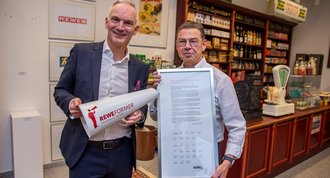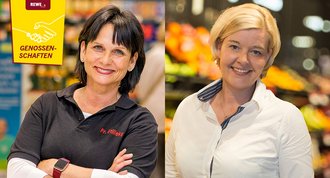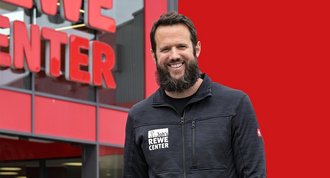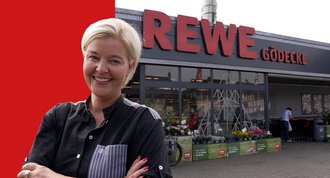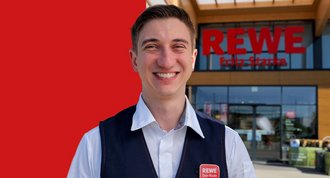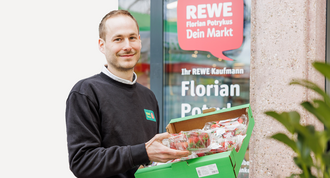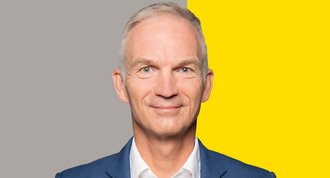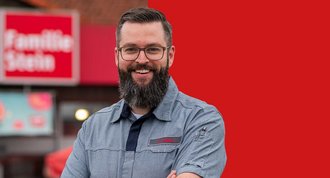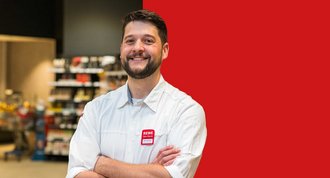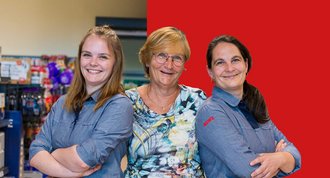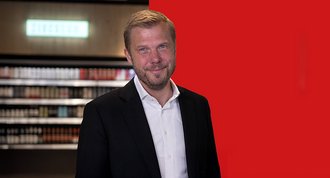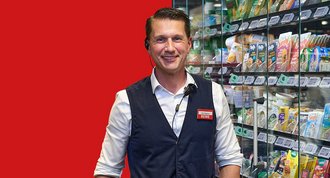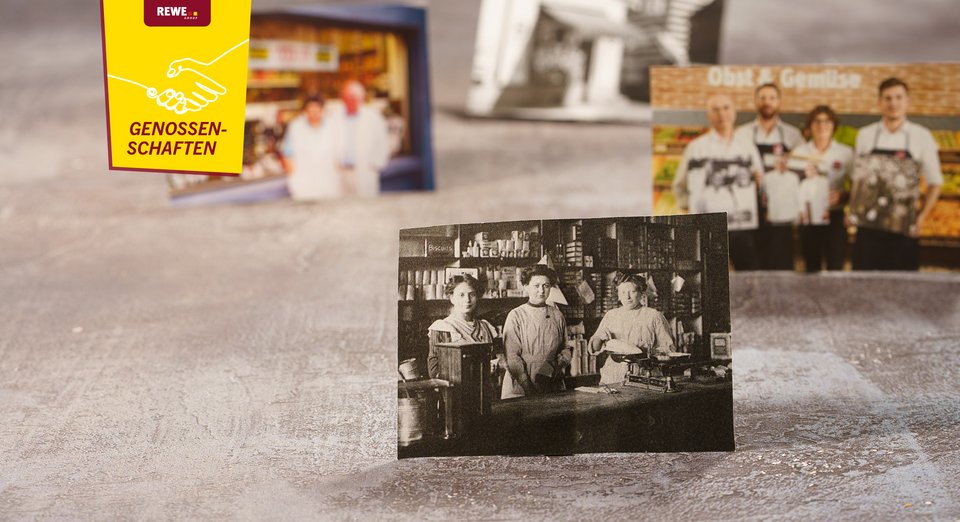
They have been at the forefront for more than 100 years and yet tend to remain in the background in public perception: the cooperatives. That could now change. With the campaign "The cooperative that creates great things." rEWE Group is confidently entering the public eye and into dialogue with its stakeholders. one is accompanying the bold campaign with a small series on the topic. To kick things off, read the interview with Thomas Nonn, the REWE Group Divisional Director responsible for the Self-Employment and Co-operatives division.
They have proven to be extraordinarily robust and competitive over the decades: cooperatively structured companies like REWE Group. In the one_Interview, Divisional Director Thomas Nonn talks about the appeal of a model that remains current and timeless values.
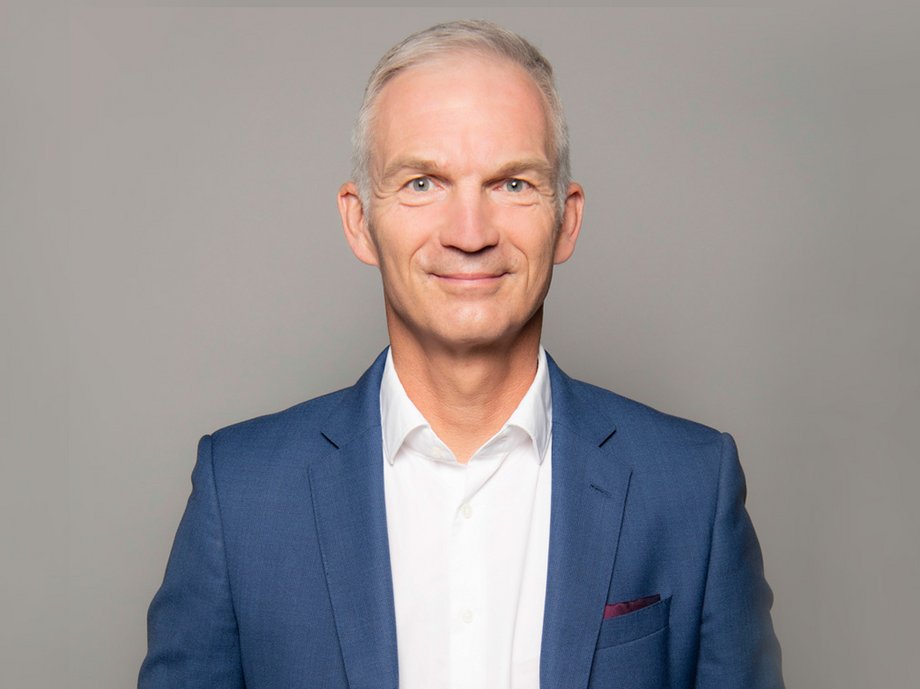 Thomas Nonn
one: REWE Group is approaching its centenary. The merger of small purchasing co-operatives has become one of the largest trading and tourism companies in Europe. What does the REWE Group of today still have in common with the company of the past?
Thomas Nonn
one: REWE Group is approaching its centenary. The merger of small purchasing co-operatives has become one of the largest trading and tourism companies in Europe. What does the REWE Group of today still have in common with the company of the past?
Thomas Nonn : Our roots in independent entrepreneurship were established when we were founded and are still there today. Back then, the wholesale co-operatives founded today's REWE Group. The members of these co-operatives, the independent retailers, thus became indirect owners of the Group. This has remained unchanged over the years and is the core of our business. We are also united by our shared co-operative values.
one: In what way?
Nonn: A cooperative is never short-term orientated, but thinks beyond generations. This becomes particularly clear when we look at the development of our regional cooperatives. Some of them are over 100 years old and therefore older than the REWE headquarters. This shows that their actions are geared towards the long term. This includes having values. These co-operative values are still valid. Throughout all developments, these values have been more or less in the spotlight, but they have always been there. Since 2009, they have once again taken centre stage. How they are practised always depends on the people involved.
one: What values are these, for example?
Nonn: Sustainability, for example, is in the original DNA of cooperatives. Independent livelihoods should be preserved over generations. Our corporate culture is characterised by stability, trust and cohesion. At the same time, the cooperative structure, by its very nature, also stands for a high degree of responsibility towards each individual and the organisation as a whole.
one: The winds on the labour market have changed and we are now talking about an employee market. Companies are faced with the challenge of no longer being able to adequately fill many positions. Do you think REWE Group can score points as a cooperative?
Nonn: A co-operative structure offers a great deal of security and stability. A cooperative organisation is committed to its members. This distinguishes the cooperative from a listed company, for example, which has to deliver quarterly figures and ensure that the share price remains high. As a cooperative, we can position our company in such a way that we simply continue to do good business. That's a big difference. You can see that too: there has never been a big wave of redundancies at REWE. When I read today that successful companies are cutting 10,000 jobs, for example, I have to say that there has never been anything like that at REWE. That's what I mean by stability. I believe that REWE's market presence and its development alone have made it more attractive in recent years. This culture of values, how we treat each other, how we work together, all this is difficult to convey to the outside world, you have to experience it. It is therefore important to offer young people the opportunity to get a taste of REWE.
one: What's more, the spectrum is huge if you don't just look at the administrative areas.
Nonn: That's true. With regard to self-employment, we are also interested in attracting both internal and external employees to set up their own businesses. To this end, we have developed models that are attractive in terms of Business Administration. At the same time, becoming self-employed with us is something that requires knowledge in many different specialisms, for example merchandise, personnel, marketing, goods procurement and much more. This is also an exciting prospect for those with a Bachelor's or Master's degree, especially in comparison to a specialist position. The way in which we cultivate, develop and understand this independence within the basic cooperative concept is something special. For me, independence at REWE is a value in itself.
one: Co-operatives are always in vogue when the market has failed as a management tool - would you agree with that?
Nonn: Perhaps not in such absolute terms and with such intensity. If the market really fails, then we all have a problem, no matter what form it takes. But in uncertain times, the stability I mentioned is what counts. We saw this during the financial crisis, which the cooperative banks weathered somewhat better than other financial institutions. Back to food retailing: who are the two retail organisations that have been successful on the market longer than any other retailers? They are the co-operatives REWE and Edeka.
one: The co-operative form is not always easy. It takes time to hear and moderate many voices before a decision is made. In other legal forms, the management can sometimes implement things much more quickly. How would you assess this at the moment, when everything is in upheaval politically?
Nonn: There is a misconception associated with what you said. Co-operatives don't mean that we are doing grassroots democracy, but that we have to create structures in which we remain capable of acting. For example, our structures allow us to incorporate expertise from the markets into management decisions. There may be one or two more coordination loops than in a family business, but thanks to the coordination with retailers, we have a much higher acceptance of implementation. In all my years at REWE, I've never had the impression that we don't manage to achieve the necessary speed depending on the situation. For me, this is a question of organisation and culture. Of course we discuss things, which is often necessary in order to shed light on all facets. But when it comes to getting an issue on the road, I don't think we've ever lost time unnecessarily.
one: What is the current situation in the national full-range? How are things looking for the next generation of retailers?
Nonn: It looks good! We currently have around 150 prospective trainees in the pipeline who are undergoing training to become a salesperson and are waiting to apply for an advertised position. And we are constantly adding new applicants. The majority of our new retailers are former store managers. We are also opening up new channels. For example, we are preparing young people with an academic degree for self-employment in a two-year trainee programme. This programme is very well used. For two years now, retailers have also had the opportunity to offer high school graduates a dual study programme in their company. They get to know the practical side of the business in the store, study on the side, obtain a generally recognised university degree and thus embark on the path to self-employment with REWE. That's a great story. Then there are also interested parties who come from a sales function at REWE and also those who approach us from outside. And, of course, there are also junior staff from the retailers who are interested in taking the step into self-employment. In short, the pool is well filled. My goal was and always has been: we have to be so attractive in everything we do and offer in terms of self-employment that interested parties queue up to become self-employed with REWE.
one: What monetary background is required? Do I have to have a minimum deposit?
Nonn: We have various cooperation models: the REWE partnership model comes first, but we also offer self-employment in a franchise model. A key anchor in the philosophy of the partnership model is that a lack of capital should not be an obstacle to suitable applicants taking the step into self-employment. There is no better entry model for self-employment than ours because it limits capital requirements and risks to a level that cannot be found anywhere else. An attractive model combined with successful sales concepts is the prerequisite for finding good applicants for self-employment.
one: REWE Group launched its first cooperative campaign this year, which is primarily aimed at political stakeholders. What do we have to offer politicians as a unique selling point?
Nonn: Politics, especially economic policy, has a strong focus on small and medium-sized enterprises. And as a cooperative, we are one of the largest co-operatives for SMEs. By making it clear that we as an organisation stand for independent livelihoods - with everything that goes with it, such as jobs, infrastructure in localities, etc. - politicians recognise that we are a stable pillar of our economy. As retailers, we are reliable and the first to help, even in times of crisis such as coronavirus or the flood disaster in the Ahr valley. We need to anchor virtues such as stability, consistency and reliability over generations even more firmly in people's minds. This is the aim of the cooperative campaign. The question of what makes us different is not so easy to convey. In earlier decades, REWE was not particularly visible to the public as a co-operative. Even today, many people are still surprised that REWE is a cooperative. We want to change that. That is why, for example, we are present in many associations, trying to get involved and position ourselves in the co-operative landscape.
one: For the first time in its history, REWE Austria recently put BILLA stores in the hands of independent retailers. What has the experience been like so far?
Nonn : In Germany, we have had a lot of positive experience working with independent retailers in recent years. In this respect, it was only logical to consider whether a similar model with BILLA might not also be something that could improve the competitive position in Austria. Privatisation is not an end in itself, but a Business Administration success factor. We have the advantage of being able to draw on experience from Germany. Of course, there are national peculiarities to consider. We have succeeded in developing a model that will be successful in Austria. Three BILLA retailers have already launched in 2022. We want to increase this number to 15 by the end of 2023.
one: Are these retailers also organised in a cooperative?
Nonn: No, not yet, but there are plans to bring them together in a co-operative structure once there is a relevant number of BILLA retailers.
Thomas Nonn represents the interests of the self-employed within REWE Group as well as at national and European association level. As Divisional Director , he is responsible for the Self-Employed and Co-operatives division. Nonn is one of the initiators of "REWEformer", which has played a key role in shaping the cooperation between REWE and independent retailers for 13 years. Thomas Nonn is involved at cooperative association level, including on the executive committee of the Mittelstandsverbund - ZGV e.V. (Association of Small and Medium-Sized Enterprises). He has also been President of Independent Retail Europe since 2019.
He is also a member of the Association and Administrative Board of the DGRV (Deutscher Genossenschafts- und Raiffeisenverband e.V.) and is active on the Management Board of the Förderverein für das Genossenschaftswesen at the University of Cologne as well as on the Supervisory Board of the ADG (Akademie Deutscher Genossenschaften) in Montabaur. The manager is also a member of the Management Board of the German Friedrich Wilhelm Raiffeisen Society.

